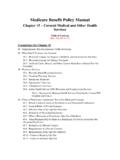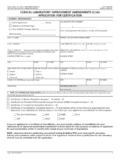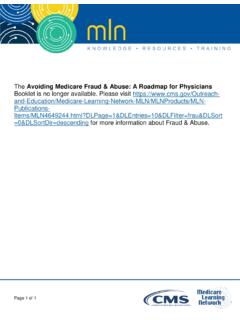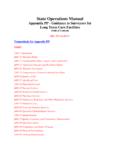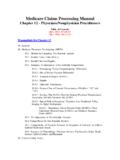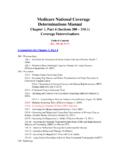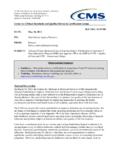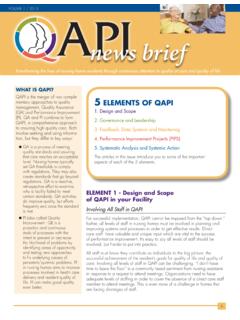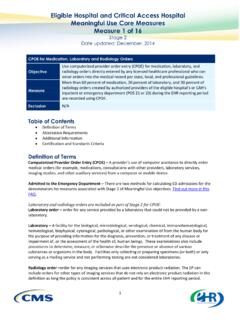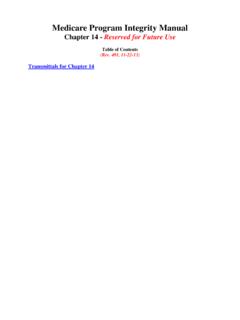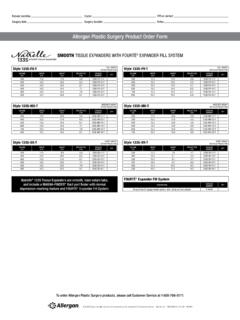Transcription of Center for Clinical Standards and Quality/Survey ...
1 DEPARTMENT OF HEALTH & HUMAN SERVICES. Centers for Medicare & Medicaid Services 7500 Security Boulevard, Mail Stop C2-21-16. Baltimore, Maryland 21244-1850. Center for Clinical Standards and Quality/Survey & Certification Group Ref: S&C 18-08-NH. DATE: December 22, 2017. TO: State Survey Agency Directors FROM: Director Survey and Certification Group SUBJECT: An Initiative to Address Facility Initiated Discharges that Violate Federal Regulations Memorandum Summary Federal regulations allow facilities to initiate discharges of residents only in specific instances. Despite these protections, discharges which violate Federal regulations continue to be one of the most frequent complaints made to State Long Term Care Ombudsman Programs. The Centers for Medicare & Medicaid Services (CMS) has begun an initiative to examine and mitigate facility-initiated discharges that violate federal regulations.
2 CMS is examining State survey agency's intake and triage practices for these type of discharge complaints, developing examples of inappropriate and appropriate discharges for surveyors, identifying best practices for nursing homes, developing training and evaluating enforcement options for these types violations. Civil Money Penalty (CMP) Reinvestment Projects Assistance. CMS is encouraging States to pursue CMP-funded projects that may help prevent facility initiated discharges that violate federal regulations. Background Federal regulations governing long term care facilities provide many protections for all nursing home residents, including the right to remain in the facility unless a limited set of circumstances apply: (c)(1)(i) The facility must permit each resident to remain in the facility, and not transfer or discharge the resident from the facility unless.
3 (A) The transfer or discharge is necessary for the resident's welfare and the resident's needs cannot be met in the facility;. (B) The transfer or discharge is appropriate because the resident's health has improved sufficiently so the resident no longer needs the services provided by the facility;. Page 2 State Survey Agency Directors (C) The safety of individuals in the facility is endangered due to the Clinical or behavioral status of the resident;. (D) The health of individuals in the facility would otherwise be endangered;. (E) The resident has failed, after reasonable and appropriate notice, to pay for (or to have paid under Medicare or Medicaid) a stay at the facility. Nonpayment applies if the resident does not submit the necessary paperwork for third party payment or after the third party, including Medicare or Medicaid, denies the claim and the resident refuses to pay for his or her stay.
4 For a resident who becomes eligible for Medicaid after admission to a facility, the facility may charge a resident only allowable charges under Medicaid; or (F) The facility ceases to operate. Facilities are required to determine their capacity and capability to care for the residents they admit, so in the absence of atypical changes in residents' conditions, it should be rare that facilities who properly assess their capacity and capability of caring for a resident then discharge that resident based on the inability to meet their needs. Occurrence of Facility initiated Discharges/Evictions Facility-initiated discharges continue to be one of the most frequent complaints made to State Long Term Care Ombudsman Programs. In FY 2015, discharge/eviction'' was the most frequent nursing facility complaint category processed by the Long-Term Care Ombudsman Programs nationally.
5 Discharges which violate federal regulations are of great concern because in some cases they can be unsafe and/or traumatic for residents and their families. These discharges may result in residents being uprooted from familiar settings; termination of relationships with staff and other residents; and residents may even be relocated long distances away, resulting in fewer visits from family and friends and isolation of the resident. In some cases, residents have become homeless or remain in hospitals for months. The reasons for non-compliant discharges can vary. Analysis of federal deficiencies indicate that some discharges are driven by payment concerns, such as when Medicare or private pay residents shift to Medicaid as the payment source. The most commonly reported reason that residents are discharged is due to behavioral, mental, and/or emotional expressions or indications of resident distress.
6 Sometimes facilities discharge residents while the resident is hospitalized for health concerns unrelated to the behaviors that form the alleged basis for the discharge. CMS is evaluating facility initiated discharge issues in nursing homes and considering a variety of interventions, including surveyor and provider training, intake and triage training, CMP- funded projects that may help prevent facility initiated discharges that violate federal regulations, and enforcement. CMP Proposals Encouraged CMS is encouraging States to consider CMP reinvestment proposals that would utilize funds to prevent improper facility initiated discharges. Page 3 State Survey Agency Directors Please see S&C 12-13-NH for information on how to submit proposals for CMP funds ( Certification/SurveyCertificationGenInfo / ). Such proposals may include but are not limited to the following: Projects designed to educate residents and their families on their rights in relation to facility initiated discharge.
7 Projects creating teams of health professionals who could provide immediate support to facilities around the state to reduce risk of harm to self or others when a resident is exhibiting expressions or indications of distress. Such support may include consultation, resident assessments, and/or creating a more person-centered plan of care. This may be accomplished through in-person consultation or remotely with telemedicine;. Projects designed to educate facility staff on best practices for engaging residents and families in collaborative strategies such as person-centered environments and care plans to reduce resident distress; and/or Formation and support of a collaborative group focusing on nursing home issues such as resident placement or transitional care, residents expressing or indicating distress, or medically complex residents such as those with dementia or delirium.
8 Group members may consist of nursing homes, ombudsman, local hospitals, providers of long term services and supports, the regional QIN-QIO, and other stakeholders who have a vested interest in the protection and quality of care nursing home residents receive. Appropriate use of CMP funds for this project may include but are not limited to a meeting space, facilitator, or administrative support for the group. Examples of organizations that could qualify include but are not limited to consumer advocacy organizations, resident or family councils, professional or state nursing home associations, private contractors, etc. We note that funds cannot be used to supplant activities that are already required or funded. For example, it may be appropriate for representatives from QIN-QIO or ombudsman organizations to participate in activities related to these projects, but their specific engagement shouldn't be funded through CMP.
9 Funds. Transfer of Cases to the RO. As part of the effort to fully address facility initiated discharges that violate federal regulations, CMS will review deficiencies precipitated by facility-initiated discharges. Unless directed otherwise by the CMS Regional Office (CMS RO), State survey agencies must transfer any case involving facility initiated discharge violations to the CMS RO for review where there is placement in a questionable or unsafe setting, where residents remain hospitalized, where there is a facility pattern, or other circumstances that the RO may identify of cases they would like transferred. This does not change any other enforcement policies that identify cases that must be transferred to the RO. Following review, the ROs may take enforcement action if they deem it is proper. Page 4 State Survey Agency Directors Tags related to facility-initiated discharges include: F177/F560: Right to Refuse Certain Transfers F208/F620: Admissions Policy F201/F622: Transfer/Discharge Requirements (Basis for Transfer/Discharge of Resident).
10 F202/F622: Transfer/Discharge Requirements (Documentation for Transfer/Discharge of Resident). F203/F623: Notice Requirements Before Transfer/Discharge F204/F624: Preparation for Safe/Orderly Transfer/Discharge F205/F625: Notice of Bed Hold Policy Before/Upon Transfer F206/F626: Permitting Residents to Return to Facility Contact: For questions or concerns, please contact Effective Date: Immediately. This memorandum should be communicated with all survey and certification staff, their managers and the State/Regional Office training coordinators within 30. days of this memorandum. /s/. David R. Wright cc: Survey and Certification Regional Office Management
